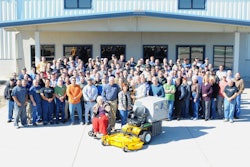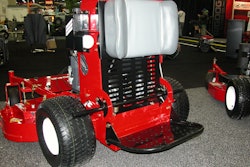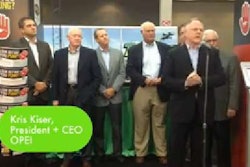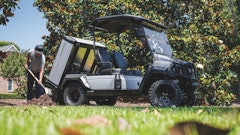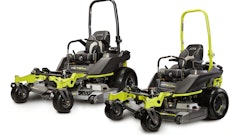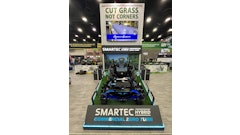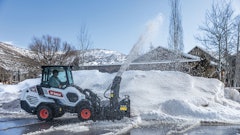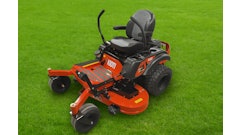First-class dealers are always looking for ways to improve their operations. Focusing on speedy service, profitable parts management or marketing to grow business are just a few ways dealers strive to improve.
For Dean Davis of Dogwood Fireplace & Lawn in Carbondale,IL, being environmentally friendly was always a focus. Knowing how to operate in such a manner was where the challenge laid.
A little help from the EPA
In the early 1990s, Davis decided to take action and contacted the Illinois Environmental Protection Agency (EPA) for their assistance in the endeavor. Davis knew what he was potentially taking on by having the Illinois EPA visit and evaluate his dealership, but said the decision was fairly easy.
“We had always tried to be environmentally friendly, but like everyone else I was afraid of the EPA. This was before Google was available to research regulations,” explains Davis. “Then I heard of the ‘no fault, no fine’ program at the Illinois EPA.”
When contacted, the Illinois EPA will visit a business to be sure that all aspects of the operations are compliant. Once the business owner feels he has addressed every issue fully, the EPA is called back out to review market those efforts with signage and word of mouth. By proactively aiming to get compliant, businesses are given the benefit of a systems review without penalty.
“People in general live in fear of the EPA after hearing horror stories about horrendous fines, and would rather stay under the radar,” says Davis. “Once I found out about ‘no fault, no fine’ it was easy to contact them. I could get in compliance and know how to stay in compliance without having to worry about it.”
Not many things within the dealership needed correcting, with the focus being on waste disposal. “I had to contact a licensed waste hauler,” explains Davis. “Before they haul off any waste they do an analysis of its contents.” The more fluids in the mix the higher the price paid for hauling and disposal.
“It’s really a question of how much you want to pay,” says Davis. “It’s expensive enough for just gasoline with a little bit of two-cycle mix. If they find other things the price per gallon really goes up.” Davis also sells some electric-powered equipment and EPA-compliant wood burning and gas fi replaces. The dealership is lit by energy-efficient bulbs.
The corrections sited only took roughly two weeks to right and the EPA was asked back for a second visit. They gave Davis a certificate at the end of their return visit, certifying that he was in compliance. It is now displayed on the show floor for all to see.
Selling green
Aside from peace of mind, Davis also now had the opportunity to attract another market segment. “Some people are quite concerned about the environment while others couldn’t care less,” says Davis. “The ones who are concerned like to see what we are doing.”
Maintaining his green operation has been beneficial for Davis because he is able to market those efforts with signage and word of mouth. Customers appreciate the fact that not only is all of the power equipment sold at his dealership EPA-compliant, but he works hard to be certain customers are clear on how to operate it. People who are used to saws from years ago need to be educated on the proper use and maintenance of environmentally friendly machines.
“Educating the consumer has become a constant effort,” explains Davis. “We have developed a handout sheet that we give to each customer when they pick up their equipment, educating them on what fuel to use, how to store it properly and other things that need to be taken into consideration.”
Davis relates that customers appreciate the careful attention he and his employees pay to educating them on proper operation and maintenance. “If they actually read the materials and follow the guidelines, their machine will stay out of the shop longer,” he explains further. “They appreciate that we are helping them extend the life of the machine, and are not just waiting for their repairs to come into our shop.”
Recovering costs
Starting with the EPA visit, which is free of charges and fines, green operation is a cost-effective way for dealers to invest in their businesses. “There is a correlation between being green and being cheap,” says Davis, who admits he is more likely to save than spend. The initial cost of the green measures leads to large savings in the end—it’s an investment.
For some of the costs, like environmental fees, Davis charges his customers a disposal fee. “We charge customers for what we call an ‘EPA Disposal Fee’ for disposing of waste gas and oil,” explains Davis. “We charge them according to the size of the equipment, helping us recover some of the associated costs.” For customers that inquire about the fee, Davis and his staff use it as another opportunity to talk about what they are doing to remain environmentally responsible.
Most of the customers who are less concerned about the environment and more interested in out-of-pocket costs understand the charges when told about the cost of having the waste hauled off.
While the waste disposal system is a simple one for employees to understand, Davis will dock pay if waste is not disposed of properly. But as he explains it, this is not really an issue. “Mechanics and warehouse workers don’t want to breathe those fumes so they are happy to comply when considering the health benefits,” Davis assures.
Davis continues to support the environment with his practices and often consults Keep Carbondale Beautiful (Clean & Green), affiliate of Keep Illinois Beautiful and Keep America Beautiful. Now Davis is also able to keep up to speed on regulations by regularly visiting epa.gov and other websites specializing in environmental regulations.
He believes operating green is something all dealers should consider. “It gives you peace of mind knowing that you are doing the right thing for the environment,” says Davis. “It will enhance our industry’s reputation if more dealers go green.”




